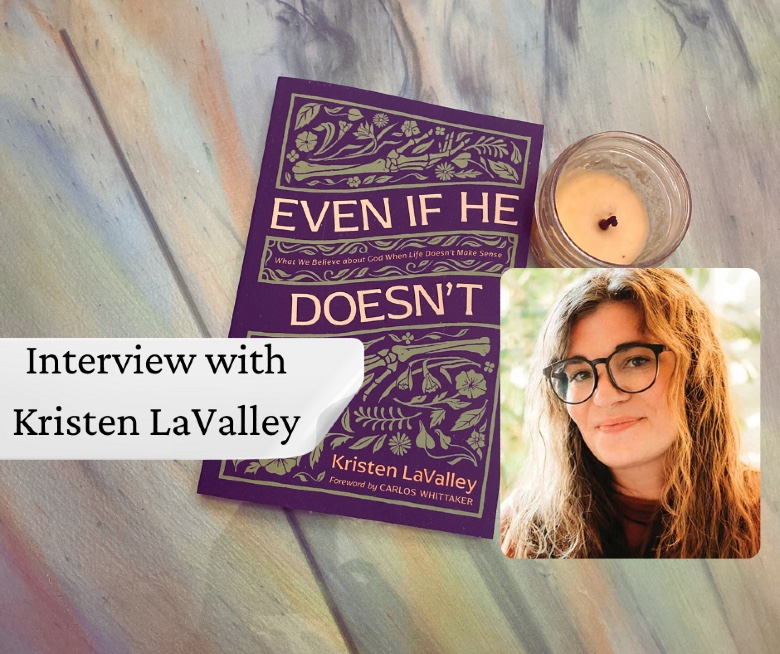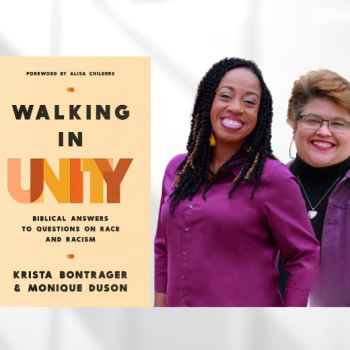
Even If He Doesn’t: Interview with Kristen LaValley
Have you ever wondered how best to help your friend who is suffering? Or are you smack dab in the middle of processing pain as a believer, trying to make it make sense? What role does God play in our hurt if any? Kristen LaValley ponders these through her own perspective in her book, Even If He Doesn’t.
Kristen’s honesty and humility in sharing every nook and cranny of her story of suffering and God’s goodness in the midst of her pain is something we need to hear so badly as Christians. Her book offers a needed take on this subject that breaks through the picture-perfect veneer of so many shattered hearts. The ideas based in Scripture she poses gave me great pause, and relief as someone who frankly might not ever get over the things I have been through.
Upon finishing Even If He Doesn’t, I felt like I had a new perspective to chew on. Perhaps because of God’s perfect love, all encompassing grace, and victory over sin and death, it’s okay if I don’t get over my hurts in a timely manner?
Her mastery in handling these tensions of joy and grief helps us readers in processing both the times He sovereignly did and did not in our own lives. As she states, “no platitudes, just presence” should be our goal.
I hope you enjoy reading the interview as much as I enjoyed hearing her responses firsthand.
-
I really appreciate your humility in sharing your story while also sincerely respecting others’ suffering. Your words displayed such a “Who am I?” attitude like King David. Can you speak on this more, Kristen? Were you scared to write this book?
Kristen: I don’t know if scared is the right word. I just was holding a lot of tensions, and maybe just worried that it wouldn’t come across as clear that I hold these tensions of yes, I got this really good thing, but sometimes we don’t get the good thing, and I really wanted to be tender in the way that I talked about my experience, without negating my experience or like trying to justify getting the good thing by saying, “Oh but all these bad things happened so it’s okay that I got a good thing.” Because sometimes it’s okay that you got a good thing regardless of- you know? You don’t need to always qualify it, “Oh I had all these bad things happen…” So it was knowing that I didn’t want to disrespect the gift that we had been given by making it seem smaller and making it seem like I only got it because I had all these other bad things happen.
But also wanted to acknowledge that sometimes there are people who only get bad things, and they never get that miracle. So it was a really difficult space to write in and to hold all those tensions really well. I hope that I did it well.
I genuinely wanted to write something that anybody could read, and feel seen in it. But yeah, it was nerve-racking and the editing process was a lot of let’s take this word out, let’s take this phrase out, and make this a little softer here or a harder there. It was a very involved process.
-
As you were writing this book, did you have a person in mind as your wrote it? Who did you write this book for?
Kristen: I was mostly picturing someone who has gone through really hard things or has been adjacent to someone going through a hard thing, and they had their faith frameworks really challenged by that disconnect of what I believed I was guaranteed if I was a “good Christian” and the reality of my life with someone I loved’s life, and I wanted to write something that bore witness to their pain instead of offering answers to it, but just offered presence instead of platitudes or these simple theological things we say sometimes to push people past their experience. I wanted to write something that just saw people where they are, and said, “Hey, it’s okay. I am here too.”
*Gillian raises her hand here as one of those people she is writing to.
-
How do we teach our children about the Theology of Suffering well to avoid the formulaic faith of thinking that “if we do A, B, and C, then God will do X, Y, and Z,” you speak of?
Kristen: That’s a really good question, I think that a lot of theology that we have as adults is theology that we weren’t taught systematically, like we didn’t go into this Sunday School room and somebody taught us this theology. we picked it up by hearing the adults in our life who have faith talk about suffering and the way that they observe suffering and I think I used the example in the book if you hear someone talking and they’re saying, “Oh Susie is going through this really hard thing, ah, God must be trying to teach her something.” Or, “I wonder what kind of sins she had in her life.”
These conversations we have about suffering, we pick them up as children and those things we pick up become our frameworks and our paradigms for thinking. So I think just being really conscious of not just what you’re teaching your children directly, but how you’re talking about suffering, and how you are displaying compassion for other people who are going through hard things so that when your child inevitably goes through a hard thing their first response isn’t, “What is God trying to teach me? Why has God left me? Why does God hate me?” When my kids get a stomach virus, they’re like, “Where is God? Why does He hate me!?”
I think some of those things are instinctual, we can’t really prevent them from thinking that, but we can redirect it in the way that we talk about suffering around them.
-
This quote, among many, resonated with me, “There’s a huge difference between God promising something to us and God owing us something.” Have you seen spiritual entitlement in the body of Christ lately? (Because I sure have!)
Kristen: Oh, I don’t know if there’s been a time in my life when I haven’t seen that in the Bride of Christ. I think especially in American Christianity the prosperity gospel is woven so intricately into our spiritual frameworks that we don’t even realize that we have that sort of like, “Well if I do this, then God has no choice to do this for me because this is what this verse says and this is what that verse says, as long as I do those things, God is implored to bless me and protect me and whatever. I think it’s really prominent and often times subtle and we don’t really have a reason to confront it until we have a reason to confront it.
Gillian: When we’re not healed… Even if He doesn’t…
Kristen: Yeah, right.
-
You had me laughing and crying like Steel Magnolias. How has humor played a role in your journey?
Kristen: What a compliment, thank you! Oh my goodness, I saw this tweet: “Did you have a good childhood or are you funny now?” Hang on a second, don’t call me out like that!- My childhood was great. But I think for me humor was a coping mechanism growing up in the environment that I did and just having the personality that I have, humor was the way that I deflected attention from what I didn’t want people to pay attention to and has help me contextualize my life.
And I think it’s kept me sane being able to have a sense of humor in spite of the things going on around me it helps me feel grounded, it helps me not take myself too seriously, it helps me to look at the world around me and see the good and the light in it, and hopefully bring that light to the people around me.
It’s kinda funny in my friendships when I have friends going through a hard thing I’m probably not the friend that is going to like sit with you for hours and hours and cry with you. I’ll get you a cup of tea, and I’ll comfort you, and we’ll have a good time. But I’m going to say some off-the-wall things and it’s gonna make you laugh, and maybe for a second you’re not sure if you like it or not, I don’t know if I wanted to laugh at that point, but that just the kinda joy that I bring to my relationships. We’re taking this seriously, but for a second let’s not take it seriously.
Gillian: I totally love that. (I told y’all. She’s a real one. I relate to this use of humor in friendships in a BIG way! Loved her response here.)
-
I had a visceral reaction as a mom reading your story of the doctor and the decision she wanted you to make. It was about 9:30 pm and I wanted to jump in my car and find you for a hug. How can we specifically help mamas in the Church (or outside the church) who are going through a traumatic pregnancy and or post pregnancy?
Kristen: I think the best thing you can do is feed them first because that’s just one of those things, it’s the mental load, right? You have all these things that you have to decide everyday, for me it was deciding everyday if I was going to have an abortion or not, like that was my situation every time I went to the doctors appointment. It was, “These are your options…” which feels like choosing life or death everyday.
Which for us there was no choice, but all that to say when you’re having to make these decision in crisis, any kind of mental load you can take off of somebody is monumental and feeding, especially if they’re a family and they have kids to feed, taking that off their plate is great.
But the other thing I think is just sitting with someone in what they’re experiencing without offering advice, without offering spiritual nuggets, spiritual snacks. I use the example of Job’s friends in the book and how they said so many dumb things. We can all agree they said some really wrong and dumb things, but before they even spoke they sat with Job for seven days. And I think the Church in general isn’t really good at this sitting part and the grieving part and the bearing each other’s burdens part, and I think what that means is you step into with somebody and you just sit in the mud with them and maybe offer them a rope at some point, but first you gotta get down in the mud and experience that darkness with them, and it’s really hard, it’s heavy.
You definitely need to know what you’re capacities are when someone’s going through something and you wanna help them you gotta kinda like gauge what is my emotional capacity here, how much can I take? But I think it’s really important to be with people and what they’re experiencing instead of trying to immediately be like, “Oh but you know everything happens for a reason, and God’s gonna make this okay!” Like, you don’t know that. So just step into it and be with them, and offer them the ministry of presence and that’s it. And then feed them!
-
Just when I thought we were headed to wrap it up, your part about messy Christians leveled me, in the best way. I have been trying to hold it together having just recovered from my 17th surgery, and you are so right about there being a suggested healing timeline for grief in the Church. I think every single one of us needs to hear you say your thoughts about Jesus and the messy Christians. I’ll start with a quote from your book,
“Messy never disqualifies you from being worthy of love, compassion, and understanding from the family of God.”
Kristen: Yeah, I think the first time that I really thought about this there was a girl in our church who had a stillborn baby, and she was posting about it on Facebook for a year, like years really, and I remember at this one point, one of the leaders of our church brought it up and said, “Don’t you think it’s time she got over it and moved on?” And I was like, “When did we decide there was a timeline for someone’s pain and their processing of that pain?”
And I had not even gone through anything particularly painful at that point, but as I’ve experienced many different traumatic things my healing process was different for each one of those things and the timeline was different for each one of them. And I think as people in general we have a limit to our tolerance, my husband and I call it the “threshold of tolerance” of what we can take from people and we step into the mud, and when we think they’ve been in the mud too long, we’re like, “Mmm, alright I’m outta here. You’re on your own. I tried! I can’t help you! You gotta figure this out.”
I think we would do well to be patient with people. I think the healing process would probably be less if we had – if as the person experienced the hurt you felt less pressure to be better and less pressure to fix your emotional life so that you can be invited to be a part of things again. I always felt like, my life was on hold until I like got it together and I didn’t even know what that would look like to get it together. But I just felt like people were waiting for me to reach this kind of like, I don’t even know. I still don’t know because I’m probably not there…
People were just like, “You know, when you’re feeling better?” Well, I think this is going to be chronic for me, so can I just like sit at the table anyway? And that’s hard to find people that can do that, but I think if we throw out the timeline and say, “It’s okay if you are hurting for the rest of your life. I’m still going to be here with you.” I think that we’ll find that people heal a lot faster and a lot more completely when we allow them the space and the time that they need.
-
Where do we start in helping our brothers and sisters who have just endured a rough church split or spiritual abuse?
Kristen: I think our words matter so much we don’t realize how much we can harm people by our questions. For me, it was people asking, “What’s the other side of the story?” Or, “Surely you must have done something wrong…” And people trying to make sense of it because if you have never experienced something like that it can be like, “Hang on a second, people don’t do that. Christians don’t do that. People don’t act like that in the house of God.”
And they do, and when you’re the person who experienced it whether you were directly involved or you’re just a casualty of the split and war that happened inside the church you can feel like you have to defend your pain or justify or qualify it. Then you start to question yourself like, “Should I be hurting? Did I do something wrong?” And I think that makes people get stuck in anger because they feel like nobody is listening to them, nobody believes them, it makes them feel like unsafe in the family of God when the family of God is like, “Um, I think you should be over that. You should just forgive. The Church didn’t hurt you, people did.” We say all these things and it makes people angry because they’re not being seen and validated and heard. I think the best thing you can do is listen.
And if you ask any questions ask, “How are you doing? Are you okay? Do you wanna talk about it?” And they will wanna talk about it because it’s a trauma and traumas you just bring it up over and over again because you are trying to make sense of it. I think the same with the healing timeline just be patient with people, listen, offer them presence and not platitudes and just believe them that they’re hurting.
Don’t try to figure out why they’re hurting or if they deserve to be hurting, just reach in your first aid kit and hand them a bandaid or a casserole, whatever you have.
-
How do you hope readers are changed by reading this book?
Kristen: I hope that they feel seen. I hope they feel understood. I hope they feel less panicked about what their pain is doing to their faith. I hope that if they’re not experiencing pain, and they’re reading the book if they just want to understand or they’re just curious, I hope that it helps them to love people who are hurting better, and to be a non-anxious, non-panicked person in a hurting person’s life.
Having read several books on this subject of suffering both for school and personal use, I can attest that Even If He Doesn’t belongs on our shelves and in our hands to give others who are in need this hard-earned word.
I shall close with my favorite quote from the book:
“The hope we have in Christ allows us to laugh while we’re grieving and dance while we’re suffering. Joy isn’t just waiting for us when we’re all healed up and “over it.” There are some heartbreaks that never fully leave us. That psalm doesn’t say, “You take away the reason I was mourning in the first place.” The thing that hurt you will always be the thing that hurt you, but you won’t always hurt in the same way. You’ll change. You’ll grow. You’ll make room for dancing. You’ll make room for joy. There are no guarantees that circumstances will get better. The only sure thing we have is that Jesus will be with us in the pain and will be our joy in spite of it.”
Where to find Kristen:














